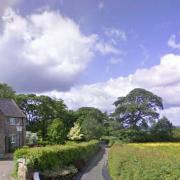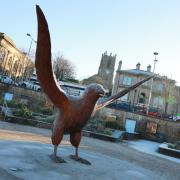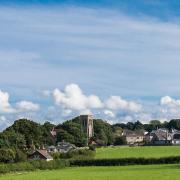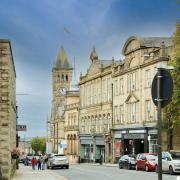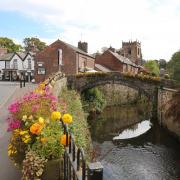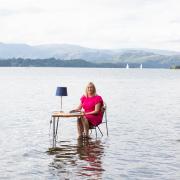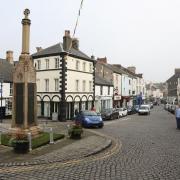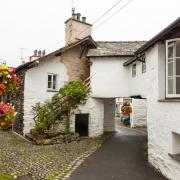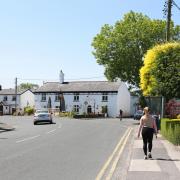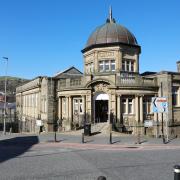Windermere has become home for people from all over the world. For 300 traumatised Jewish children who fled Nazi concentration camps it was heaven on earth. Emma Mayoh reports Main photography by John Cocks
It was like going from the depths of hell to paradise. Three hundred traumatised Jewish boys, like thousands of others, had endured years of their lives detained in Nazi concentration camps.
They had survived horrors most of us could never comprehend and when the Second World War ended they were left with nothing. Their families had been murdered, they had no homes to return to and their health was very poor. But for this particular group of boys there was hope.
In 1945, the Windermere Boys, as they became known locally, were taken by RAF planes to the pretty Lakeland town to help them escape the atrocities of their previous years. It was thought the Lake District landscape would aid their recovery.
The boys lived at the Calgarth estate, once the living quarters for workers from the Windermere Flying Boat Factory. At first they slept in large buildings on the floor but when the factory closed down, and the houses were vacated, they got to sleep in beds - many for the first time in their lives. According to locals they were keen, pleasant members of the local community.
Windermere resident Jennifer Jewell remembers their arrival. She said: ‘I was walking home from school and I saw big white strip coming towards me on the street. I didn’t know what on earth it was. As it got closer I realised it a long line of boys. They had arrived from Poland but their new clothes hadn’t. They didn’t let that stop them though so they were walking through the streets in their white vests and underwear.
‘There were lovely boys. Part of the lake was once cordoned off to make a swimming pool and the boys would often be down there. They were all so delighted and grateful to have been brought here. It was hard to believe the atrocities they had seen and lived through. They said coming to Windermere was like being in paradise.’
An exhibition of the group’s time in the town is on show at Windermere Library. It has been put together by Trevor Avery and Chris Atkins, both directors of the charity Another Space. Since 2006, the pair have been piecing together the story of the boys’ lives in Windermere for The Lake District Holocaust Project. They have conducted historical research and interviewed residents like Jennifer who have first hand stories.
Trevor said: ‘When we first started the project we had no idea where it would lead. The story of these boys is quite remarkable and it is one that belongs to the community. But there are still a lot of people who have not heard about them.
‘Some of these boys had been found wandering the streets in Poland; others were still at the concentration camp sites which had been turned into hospitals, they were all piled into one place and the Red Cross couldn’t cope. They wanted to send these children somewhere to get better. Where better than the Lake District?’
Trevor and Chris are now working on other projects to make more people aware of The Windermere Boys. They have enlisted the help of Mark Wright, a former recipient of the British Composer of the Year Award, who is creating a piece of music to reflect the children’s lives.
The classical composition, Where We Once Walked, will include sound recordings from sites in Poland where the boys once lived. The piece will be premiered at a special event in St Mary’s Church, Windermere next month. It is hoped some of the original Windermere Boys, some living in Manchester and London now, will return for the concert.
Trevor and Chris are also putting together a series of children’s art workshops to be held throughout the summer. At the end of the year the work will be exhibited in Windermere and venues around the area and it is hoped that the shows will eventually become part of an annual international children’s art festival.
Trevor said: ‘We want to celebrate childhood because these boys had theirs taken away from them. There is a gloomy side to it, of course, but speak to any of the boys who came here and they are not gloomy. They have tremendously light spirits despite their adversity.
‘They are an example to us all. We now want as many people as possible to know their story.
‘We want to create a positive legacy for the future.’
Like the Jewish refugees who came to Windermere, many more people decide to retreat to this idyllic haven. One example is John Raw. He spent most of his career travelling the world working for the oil industry and has lived in Abu Dhabi, Canada and the United Arab Emirates. He was based in Oman during the first Gulf War and was also living just 300 yards away from the site of the Khobar Towers bombing in Saudi Arabia.
But John, now 69, spends his leisure time at Windermere Golf Club where he is club captain. The views from the rolling course are a world away from the deserts of the Middle East. And the club is now preparing for the highlight of its calendar, the Pro Am, when amateur golfers travel to Windermere from across the north to compete with professionals.
John said: ‘It is a fantastic event and one that takes a lot of planning. But it is all worth it because people have such a good time. We’re very much looking forward to it.’
Some people, of course, come to Windermere, simply for a holiday and much of the town is devoted to the tourism industry but one hotel provides a special service.
The Windermere Manor Hotel is the only hotel in the area to have been purpose-built specifically for visually impaired and blind people.
The hotel, opened by Guide Dogs for the Blind, is now owned by Action for Blind and is run on a not-for-profit basis. The building has large print telephones, Braille print on many of the doors, menus and signs, and an exercise area for guide dogs.
Guests are also able to enjoy day trips and excursions - everything from shopping in a nearby town to hiking up fells and mountains.
Hotel general manager Chris Lawrence said: ‘Some of our guests may have been accomplished climbers before they lost their sight. ‘They still want to do it and we are able to help them. We do lots of activities for people to try.
‘There are also few hotels in the country who do what we do. ‘Our visually impaired and blind guests want to come on holiday and not worry about anything.
Quite often people are isolated and holidays are impossible but we can change that for them and we are very proud of what we do.’
Tourism takes control
When the future of the Tourist Information Centre in Windermere was threatened, the locals knew something had to be done. This valuable resource is used by the millions of visitors who come to Windermere and the Lake District every year.
Desperate to keep the service going, several organisations and business put forward tenders to run it. But the Lakes Hospitality Association got the job.
Jonathan Denby, chairman of the group and whose Damson Dene hotel recently featured in a Channel 4 reality show, said: ‘If people come to the Lake District I would say the majority of them come to Windermere first. It is the gateway to the Lakes.
‘And the Tourist Information Office is a likely starting point for many of these people too. No matter how much research I have done on the internet before I go on holiday, I always go to the tourist information to get information. We are very pleased to have kept this service going.’
The Lakes Hospitality Association is made up of hotels, guests houses and tourists attractions in the Lake District.
Where is it? Windermere is located in the South Lakes between Staveley and Ambleside. Type LA23 1QA in your sat nav to get you there.
Where can I park? There are a number of pay and display car parks, including at Windermere railway station and in Broad Street. There is also some limited time free parking and on street parking.
What can I do? Take a cruise on Windermere, browse one of the local art galleries, visit an exhibition at Windermere Library, go on an off-road tour or take a walk in the park.
Are there refreshments? There are plenty of cafes and restaurants to choose from, offering cuisine from around the world.



